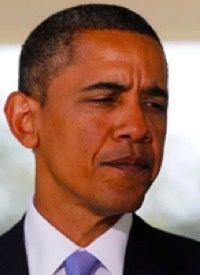
“To me, terrorists should not be able to hide behind their passports and their citizenship, and that includes U.S. citizens, whether they are overseas or whether they are here in the United States,” Obama’s Deputy National Security Advisor for Homeland Security and Counterterrorism John O. Brennan told the Washington Times in June 2010. Brennan said at that time that “dozens” of American citizens were on Obama’s assassination list. New Mexico native Anwar al-Awlaki is reportedly on the assassination list, but the list itself remains classified. Anwar al-Awlaki is thought to be hiding out from the United States in Yemen.
Candidate Obama didn’t even believe a President had the right to arrest and hold a U.S. citizen without charges before 2008, let alone assassinate them. When asked in a December 2007 Boston Globe interview, “Does the Constitution permit a president to detain US citizens without charges as unlawful enemy combatants?” Obama replied: “No. I reject the Bush Administration’s claim that the President has plenary authority under the Constitution to detain U.S. citizens without charges as unlawful enemy combatants.”
Obama’s campaign literature was even more explicit that suspected criminals deserve trials: “[Barack Obama] firmly believes that those who pose a danger to this country should be swiftly tried and brought to justice, but those who do not should have sufficient due process to ensure that we are not wrongfully denying them their liberty.”
Obama’s jump from requiring trials as a candidate to extra-judicial assassinations is the reverse principle that emerged from the post-World War II Nuremberg trials of Nazi war criminals. Toward the end of WWII, the U.S. Secretaries of State and War and the Attorney General wrote a memorandum to President Roosevelt (January 22, 1945) stating that the Allies, in response to Nazi atrocities,
…could, if they elected, put to death the most notorious Nazi criminals, such as Hitler or Himmler, without trial or hearing. We do not favor this method. While it has the advantages of a sure and swift disposition, it would be violative of the most fundamental principles of justice, common to all the United Nations. This would encourage the Germans to turn these criminals into martyrs, and, in any event, only a few individuals could be reached in this way.
We think that the just and effective solution lies in the use of the judicial method. Condemnation of these criminals after a trial, moreover, would command maximum public support in our own times and receive the respect of history. The use of the judicial method will, in addition, make available for all mankind to study in future years an authentic record of Nazi crimes and criminality.
President Obama has completely reversed this Nuremberg principle.
Candidate Obama pledged to kill Osama bin Laden, a war criminal and mass murderer of this generation. “We will kill bin Laden; we will crush Al Qaida,” Obama claimed in the Second Presidential Debate October 7, 2008. “That has to be our biggest national security priority.” But it was unclear from the context of that debate if Obama meant he would kill bin Laden through a military assassination or capital punishment after a jury trial. His statements earlier in the same campaign seemed to indicate the latter. “I think that, if we have Osama bin Laden in our sights and we’ve exhausted all other options, we should take him out before he plans to kill another 3,000 Americans. I think that’s common sense,” Obama said in primary debate August 19, 2007. The “exhausted all other options” phrase seems to indicate he would make an honest attempt to bring bin Laden to justice just like the Nazi war criminals.
But that never happened. And Obama’s extra-judicial killing of bin Laden drew the ire of a Nuremberg prosecutor. “Jubilation over the death of the most hunted mass murderer is understandable, but was it really justifiable self-defense, or was it premeditated illegal assassination?” asked Benjamin B. Ferencz, a prosecutor at the Nuremberg trials, in a May 3 letter to the New York Times. Ferencz, 92, told the London Guardian of media reports of bin Laden’s killing: “The picture I get is that a bunch of highly trained, heavily armed soldiers find an old guy in pyjamas and shoot him in the chest and head, and that borders, without access to more facts, on murder.” He added: “Even [the head of the Luftwaffe Hermann] Göring had a right to trial.”
Ferencz noted that “the Nuremberg trials earned worldwide respect by giving Hitler’s worst henchmen a fair trial so that truth would be revealed and justice under law would prevail. Secret nonjudicial decisions based on political or military considerations undermine democracy. The public is entitled to know the complete truth.” Ferencz also told the Canadian Broadcasting Corporation after the bin Laden killing:
We had that same issue come up long before, at Nuremberg where there was a sharp division. The British were in favor of a political solution, which meant taking out somebody and shooting them. We didn’t know clearly who and how many. The Russians were also in favor of just shooting all the top leaders before you could stop counting. And the Americans said, “No way. We’re going to give them a fair trial and under the rule of law, with all the rights. It will be an open and public trial.” And that decision, in my judgment, was absolutely the correct decision. It has withstood the test of time. America was hailed throughout the world for its fairness and for the way they conducted themselves against their terrible enemy. And I was hoping we would continue that tradition.
But Obama has apparently discontinued that tradition with the bin Laden killing and his own private assassination list that includes “dozens” of U.S. citizens that his advisors say may be killed inside the United States.
Photo: AP Images
Related article:



